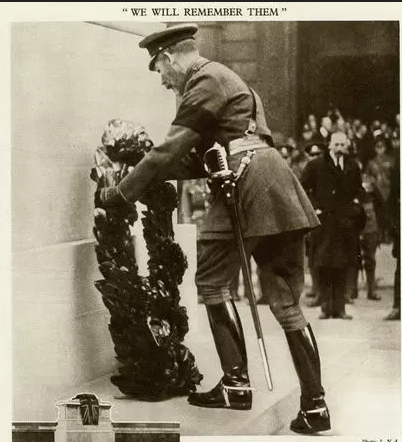nchsman
19 posts
Latest Posts by nchsman

On this day 94 years ago, “Metropolis” (1927) premiered in Germany. The expressionist sci fi collaboration between Thea von Harbou and Fritz Lang remains one of the greatest achievements of the era of silent cinema and, indeed, of cinema in general.





Brigitte Helm as Maria in Fritz Lang´s Metropolis (1927)


November 11, 1919 - First Anniversary of the Armistice
Pictured - King George V lays a wreath for the fallen at the temporary Cenotaph in London.
No conflict had ever affected so many millions of Europeans as the Great War. Out of the 70 million or so people mobilized during the war, 9.5 million had died. In some nations the war had almost literally wiped out a generation - in Britain, Turkey, and Serbia, for example, 60% of men between 20 and 30 years old had perished. The scale of suffering and grief on the continent was unprecedented, and the following years ushered in a series of new rituals of commemoration as people grasped for ways to cope with the loss of their comrades and loved ones.
The victorious Entente powers had held their triumphs in the summer of 1918. The largest was on July 14, France’s fête nationale, when contingents of troops from each nation marched under the Arc de Triomphe to the thunderous applause of the Parisian crowd. But for many men and women there was a sense that it was not enough to celebrate the victory. Its price had to be remembered too. In London, the army paraded past an empty tomb known as a cenotaph, erected to commemorate the missing dead. And the French parade was led by a visible reminder of the war’s cost: a contingent of wounded veterans, the mutilés de guerre, described by an American correspondent :
“Very many of the mutiles have one leg, one arm, one eye gone. Many are on crutches… Some cannot walk; some, with both legs gone, can never walk. These are wheeled on long, low chairs by the more able-bodied wounded or by nurses. Some of the mutiles are totally blind and are led by their comrades.”

Jean Galtier-Boissière - Défilé des mutilés, 1919.
While the triumphal parade was an ancient celebration of victory, the empty cenotaph foreshadowed new rituals of mourning. Industrial war disrupted many normal ways to cope with grief. It was impossible to hold to traditional funeral practices when so many bodies had been buried in anonymous graves at the front, or disappeared totally in mud and shellfire. The impossibility of finding solace in tradition made loss into a solitary and difficult experience for Europeans, but also led to the conception of new forms of commemoration.
The first anniversary of the armistice witnessed the inception of many such new rituals. Many were spontaneous. In London thousands gathered at the victory cenotaph, which had been left up temporarily. By serving as a substitute for absent war graves, the empty tomb satisfied the urge of Britons who wanted some way to mourn their missing dead. The crowd was so thick that flowers and wreaths had to be passed up by hand to the memorial. The cenotaph’s architect Edwin Lutyens recalled that “it was a mass-feeling too deep to express itself more fitly than by piles of ever-fresh flowers which loving hands placed on the Cenotaph day by day.”
Another new practice was a two-minute silence held at 11:00 AM, the hour that the armistice had been signed. After witnessing a moment of silence for the war dead in Cape Town that year, the South African Sir Percy FitzPatrick wrote to King George with the idea of making it an empire-wide practice. The King approved the idea and on November 7 issued a press statement asking his subjects that at 11:00 on the eleventh, “all work, all sound, and all locomotion should cease, so that, in perfect stillness, the thoughts of everyone may be concentrated on reverent remembrance of the glorious dead.“
Newspapers across the British empire recorded how people stopped in silence that day. After a year spent grieving in isolation, the two minutes silence caused an outpouring of emotion. A Daily Mail correspondent wrote that “mill girls cried when the looms were stopped.” Mourning became something to be shared. The Manchester Guardian reported on the emotional public reaction.
"The first stroke of eleven produced a magical effect. The tram cars glided into stillness, motors ceased to cough and fume, and stopped dead, and the mighty-limbed dray horses hunched back upon their loads and stopped also, seeming to do it of their own volition. Someone took off his hat, and with a nervous hesitancy the rest of the men bowed their heads also. Here and there an old soldier could be detected slipping unconsciously into the posture of ‘attention’. An elderly woman, not far away, wiped her eyes, and the man beside her looked white and stern. Everyone stood very still … The hush deepened. It had spread over the whole city and become so pronounced as to impress one with a sense of audibility. It was a silence which was almost pain … And the spirit of memory brooded over it all.”

Road workers in London bare their heads for a moment of silence on the first Armistice Day.
Oddly, the game most prevalent in my country is one of the few that I don't play

Most popular Paradox game by country.

Locations in Paris that the shells from “Bertha” impacted during World War 1.




Little Girl Stands Up To The First Order In Galaxy’s Edge (x)
Germany Agrees to Sign the Peace Treaty

Gustav Bauer, German Prime Minister (Chancellor after the Weimar Constitution was adopted in August).
June 23 1919, Paris–After two tense days, President Ebert had finally managed to form a government under Gustav Bauer of the SPD, in coalition with Erzberger’s Zentrum party, on June 22. The National Assembly agreed that evening to sign the treaty, on condition that Sections 227-231 be struck; these were the clauses on Allied military tribunals for the Kaiser and German war criminals, and on “the responsibility of Germany and her allies for causing all the loss and damage to…the Allied and Associated Governments…as a consequence of the war imposed upon them by the aggression of Germany and her allies.”
The Allies quickly rejected this reservation, however: “The German government must accept or refuse, without any possible equivocation, to sign the treaty within the fixed period of time.” On the morning of the 23rd, they made it clear that there would be no further extension of the deadline; the scuttling of the German High Seas Fleet had hardened the Allied position. The outcome was only made clear once General Groener (Hindenburg having left him this thankless job) told the government that a resumption of the war would be “hopeless” and that the Army advocated that the treaty be signed. The National Assembly approved the treaty in full that afternoon, and by a broader margin resolved that the patriotism of those who voted for the treaty, in order to prevent an Allied invasion occupation of the country, would not be doubted.
Official word reached Paris at 5:40 PM, only 80 minutes from the deadline; a resumption of the war was only narrowly averted.
Sources include: Margaret MacMillan, Paris 1919.
That is the only scene I can remember of this movie










We’re going to play a game called… “Who is my daddy and what does he do?” Kindergarten Cop (1990)
Germans First Hear Peace Terms

Ulrich von Brockdorff-Rantzau, Germany’s Foreign Minister for much of the first half of 1919, pictured the year before.
May 7 1919, Versailles–The Germans had been summoned to the peace conference in late April. They had hoped, as had originally been anticipated by all parties, that the last few months had been the Allies preparing their peace terms, and now would come the time for the actual peace negotiations. The German delegation brought with it crates upon crates of material to back up these negotiations that they were never to have.
On May 7, the German delegation was brought to the Trianon Palace Hotel. Clemenceau told them: “The hour has struck for the weighty settlement of oura account. You asked us for peace. We are disposed to grant it to you,” before outlining the major features of the peace deal: Germany would lose her colonies, parts of Silesia, and the Polish Corridor. Danzig would become a free city, the Saar would be effectively a French protectorate, the Rhineland would be occupied for over a decade, Germany would owe a large reparations bill, the League of Nations would not include Germany among her initial members, and that the war had been “imposed upon [the Allies] by the aggression of Germany and her allies.”
The head of the German delegation, German Foreign Minister Brockdorff-Rantzau, gave an angry speech during which he insisted on remaining seated; it did not help that his interpreters did a poor job of translating his words. In particular, he rankled at “the demand…that we shall acknowledge that we alone are guilty of having caused the war….Such a confession in my mouth would be a lie.” His words misrepresented the treaty (which never used the word “guilt”), and had almost certainly been prepared before he had even seen the text of the treaty. Lloyd George snapped an ivory letter-opener in two during the speech; Wilson called it “the most tactless speech I have ever heard. The Germans really are a stupid people. They always do the wrong thing.” Balfour was more generous, saying merely that “I make it a rule never to stare at people when they are in obvious distress.”
The mood among the German delegation, and back in Germany, was that of shock and anger, especially at the Americans, whom they had hoped would spare them. In the final weeks before the terms of the treaty were published, an American observer noted:
The Germans have little left but Hope. But having only that I think they have clung to it–the Hope that the Americans would do something, the Hope that the final terms would not be so severe as the Armistice indicated and so on. Subconsciously, I think the Germans have been more optimistic than they realized….When they see the terms in cold print, there will be intense bitterness, hate and desperation.
Sources include: Gregor Dallas, 1918: War and Peace; Margaret MacMillan, Paris 1919.
Both world wars were started by some Austrian guy being in the wrong place





Captain America on America



Jan 5 1919 Spartacist uprising or German Civil War starts. Was Power struggle between the moderate Social Democratic Party of Germany (SPD) and the radical communists of the Communist Party of Germany (KPD) https://t.co/o4m2lLbv50 https://t.co/g3xJhIvRDz http://twitter.com/ThisDayInWWI/status/1081582664249790464
Shakespeare was right, Hell hath no fury like a woman scorned.


12 snipers from the Soviet 3rd Shock Army with a total of 775 kills.
First Use of “OMG”
September 9 1917, London–Although their relationship had become highly strained over the course of the Dardanelles campaign, Churchill and Lord Fisher remained close friends afterwards. Churchill even subjected himself to some political humiliation by making an appeal in Parliament to return Fisher to the Admiralty. The two maintained a regular correspondence, and on September 9, Fisher sent Churchill a short letter. Most of it discussed German naval preparations in the Baltic. With the fall of Riga, the Germans wanted to push north, putting further pressure towards Petrograd. To do so by land seemed relatively infeasible at the time, and Riga’s usefulness as a port was limited by Russian control of the large islands in the Gulf of Riga.
The Germans planned landings on these islands, with major assistance from large portions of the High Seas Fleet (brought through the Kiel Canal for the purpose). Although their exact plans were unknown, the movement of German ships and their intention to carry out amphibious operations north of Riga were well-known enough to appear in British papers. Fisher lamented that the Germans were poised to do with a small force what the British had not been able to do the entire war (despite Churchill’s plans):
We are five times stronger at Sea than our enemies and here is a small Fleet that we could gobble up in a few minutes playing the great vital Sea part of landing an Army in the enemies’ rear and possibly capturing the Russian Capital by Sea!…Are we really incapable of a big Enterprise?
Fisher concluded his short note with this line:
I hear that a new order of Knighthood is on the tapis–O.M.G. (Oh! My God!)–Shower it on the Admiralty!!
This is the first documented use of OMG as an abbreviation for “Oh My God” in the English language.
Today in 1916: Hindenburg & Ludendorff Discuss Full Economic War Mobilization Today in 1915: US Demands Recall of Austrian Ambassador for Fomenting Strikes Today in 1914: Lieutenant Colonel Hentsch Orders a German General Retreat
You learn something new everyday

The Arlington Ladies are professional mourners who attend all funerals at Arlington cemetery. These military wives and family members brave the rain, snow, and extreme heat to visit up to 3 funerals a day. Members are not allowed to grieve or console, they are simply there to make sure no soldier is ever buried alone. Source
That look, it says, someone is gonna get cut before this is over








There is no such thing as Peri spammed. You can never get enough Peri


In honour of her birthday, prepare to be Peri spammed! 1/?